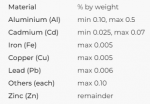fontmell
Well-Known Member
Please can someone explain to a simpleton why the anode on my sail drive and additional one over the side connnected to saildrive are both pitted /worn
The boat was re launched lat march motored to berth (10 mins) in marina the batteries all taken out no shore power connected and left till this week when towed for hhaul out again
Thanks for educating me
The boat was re launched lat march motored to berth (10 mins) in marina the batteries all taken out no shore power connected and left till this week when towed for hhaul out again
Thanks for educating me

